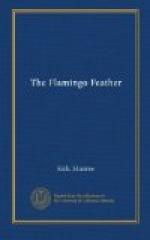So Rene de Veaux became, to all intents and purposes, a member of this tribe of Indians. The Flamingo Feather which he wore proclaimed his position among them to all men, and obtained for him that regard and respect which his own manliness and ready tact enabled him to retain and increase. He became a skilful hunter, and from his Indian companions he soon acquired all their knowledge of woodcraft. In return for this he taught them so many of the useful arts of his own civilization, that his reputation for wisdom spread far and wide over the land, and many from distant tribes came to learn of him.
From time to time rumors were brought to these Indians of the terrible cruelties practised by the Spaniards upon such natives of the country as fell into their hands. For this reason the tribe into which Rene had been adopted returned not to their own lands in the far east, but remained in the land of the Alachuas. With these people they became so closely united by ties of kinship and mutual interest that after a while no distinctions were drawn between them. Thus, upon the death of the Alachua chief, the good Micco was chosen to succeed him; and from that time he ruled over the united tribes. Among his wise men and principal advisers, those upon whom he relied the most were Yah-chi-la-ne and Rene de Veaux.
At the time of Has-se’s death, Micco’s tribe and the Alachuas had determined to be no longer annoyed by the neighborhood of the Seminole outlaws, and had despatched a powerful war-party against them. When, however, this party reached the island village in the depths of the great swamp, they found it deserted. By some means the Seminoles had obtained a knowledge of their coming, and had fled from that part of the country. The Alachuas destroyed their village, and from that time for more than a year they were heard of no more, save by rumor, which located them among the savages of the far south.
Upon a certain occasion, after he had been for many months a member of the tribe, Rene led a hunting-party, who sought to secure a large number of alligators, to the edge of the great swamp. One night as they sat about their campfire, gravely smoking their stone pipes, and listening to some of the wild traditions of their race, related by the oldest member of the party, they were suddenly startled, and all but Rene were greatly alarmed, by a flash of light and a loud explosion. It sounded from a small grove of trees not far from them, and Rene instantly recognized it as the explosion of a fire-arm.
As it had been followed by a loud cry of pain, and as groans were still to be heard, he succeeded in convincing his companions that the terrifying sound was of human origin, and in persuading them to go with him in search of its cause.
In the grove they found a young Indian writhing in agony upon the ground, while near him lay the shattered remains of a Spanish arquebuse or musket. He had evidently attempted to discharge it at some member of the hunting-party, and, either because it was over-loaded or was too badly rusted to be of service, it had burst in his hands. Although he had escaped other wounds, an examination of his face showed that his eyesight had been totally destroyed by the burning powder, and it was the pain thus caused that had drawn from him the cries and groans they had heard.




